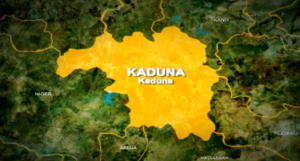Residents of Kapam, a community in Chikun Local Government Area of Kaduna State, have taken to the streets to protest against what they describe as severe environmental pollution caused by the Kaduna Refinery and Petrochemical Company (KRPC). The protests, which have drawn considerable attention, center around allegations that the refinery’s activities have led to significant ecological damage, adversely affecting the lives and livelihoods of the community members.
The situation reached a boiling point when, three days prior to the protest, the refinery reportedly released chemicals into the environment. According to the residents, this release has had disastrous effects on their agricultural activities, leading to the death of livestock and the destruction of crops. The local women, who are primarily responsible for farming in the area, were at the forefront of the protest, voicing their grievances about the dire impact the pollution has had on their farms. They reported seeing their crops wither and animals die, all of which are critical to their sustenance and economic well-being.
 In addition to the damage to agriculture, the protesters have raised serious concerns about the health implications of the pollution. Many residents, particularly children and women, have begun experiencing health issues, which they attribute to the contaminated air and water. Symptoms reported by the community include respiratory problems, skin rashes, and other ailments that have coincided with the chemical release. The women, bearing placards with inscriptions such as “Our Lives Matter” and “Stop Polluting Our Land,” blocked the main entrance to the refinery, preventing employees from entering the premises. This bold action underscores the depth of their frustration and the seriousness of their demands for immediate action.
In addition to the damage to agriculture, the protesters have raised serious concerns about the health implications of the pollution. Many residents, particularly children and women, have begun experiencing health issues, which they attribute to the contaminated air and water. Symptoms reported by the community include respiratory problems, skin rashes, and other ailments that have coincided with the chemical release. The women, bearing placards with inscriptions such as “Our Lives Matter” and “Stop Polluting Our Land,” blocked the main entrance to the refinery, preventing employees from entering the premises. This bold action underscores the depth of their frustration and the seriousness of their demands for immediate action.
The protesters are not only concerned with the immediate health effects but are also anxious about the long-term environmental and health impacts. They argue that the refinery’s operations have consistently posed a threat to the well-being of the community, citing previous instances of pollution and the refinery’s failure to adhere to safety standards. The residents have expressed deep dissatisfaction with what they see as the refinery’s neglect and indifference to the community’s plight. They lament that despite numerous complaints and appeals to the refinery management and government authorities, no substantial measures have been taken to address their concerns or to provide compensation for the losses they have incurred.
The call for action is loud and clear. The residents are demanding that both the federal government and the management of the Kaduna Refinery take immediate and effective measures to mitigate the environmental hazards posed by the refinery’s operations. Their demands include comprehensive safety measures to prevent future incidents, a thorough cleanup of the polluted areas, health interventions to treat those affected, and compensation for the losses suffered by the farmers and other affected individuals. The protesters insist that the refinery must be held accountable for its actions and that the community’s right to a safe and healthy environment must be upheld.
Despite the mounting pressure from the community, the management of the Kaduna Refinery has yet to issue an official response to the allegations. This silence has only fueled the anger and frustration of the residents, who feel ignored and marginalized. The community members argue that their voices have been consistently overlooked, and they fear that without immediate and decisive action, the situation will only worsen, leading to further health crises and environmental degradation.
The Kapam community’s plight is a stark reminder of the broader environmental challenges faced by many communities in Nigeria, where industrial activities often take precedence over environmental health and safety. The protest highlights the urgent need for stricter regulatory oversight and enforcement of environmental protection laws to safeguard the health and livelihoods of communities living near industrial sites. As the residents of Kapam continue to fight for their rights, their struggle resonates with many others who are similarly affected by environmental pollution across the country.
The situation in Kapam is a critical example of the complex interplay between industrial development and environmental stewardship. It underscores the necessity for industries to operate responsibly, ensuring that their activities do not harm the surrounding communities. For the people of Kapam, the protest is not just about seeking immediate relief from pollution; it is about asserting their right to live in a safe and healthy environment, free from the hazards imposed by industrial negligence. As they await a response from the refinery management and the federal government, the eyes of many are watching to see how this issue will be resolved and whether justice will be served for the affected community.




